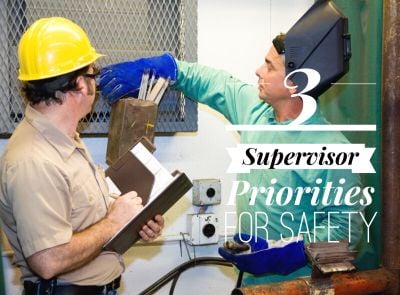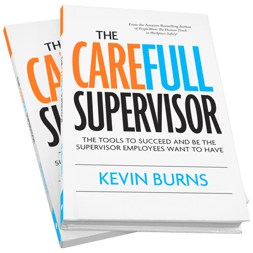Front-line supervisors need to understand that perhaps the most important position in an organization is at the front line.
 Out-of-work safety supervisor numbers are growing - especially in the energy sector. Layoffs are plentiful and competition for what few jobs there are is fierce. What’s a supervisor to do? As hard as it is to not worry about how long the slump in oil is going to last, now is a perfect time to up your game.
Out-of-work safety supervisor numbers are growing - especially in the energy sector. Layoffs are plentiful and competition for what few jobs there are is fierce. What’s a supervisor to do? As hard as it is to not worry about how long the slump in oil is going to last, now is a perfect time to up your game.
Taking the time to add to your skill-set shows character in the face of adversity. It also demonstrates your willingness to do whatever is necessary to get the job done. You demonstrate that you're willing to improve your performance when no one is paying you. Those are the traits of good leaders - not that of a nine-to-fiver. It shows your attitude and value.
When things are busy and the work is plentiful, there is never enough time (or stamina) to add to the workload by updating skills or re-tooling. But when it’s slow and jobs are few, many people will be competing for the same jobs. Being a middle-of-the-pack performer won’t get you noticed or working anytime soon. You have to bring something to the table that no one else has. Now is the time to tool-up and get the skills that will set you apart from everyone else.
So what is it going to take and what tools are you going to need? Front-line supervisors need to understand the role they play in the organization. They need to understand that perhaps the most important position in an organization is at the front line. This is where the work gets done. This is also where safety happens - or doesn’t.
There are three priorities that front-line supervisors need to focus on in their jobs:
1Focus on your own crew. That’s all you have control of. Ignore what’s happening over your head or in areas that don’t affect your directly. You can’t fix those. You have control of what’s in front of you on the ground. In front of you, that’s where incidents occur. That’s where engagement takes place. Besides, your team is depending on you to remain focused on them and to keep a level head. Keep your crew as the primary source of your attention. Keep holding them in the highest regard. These are your people and they deserve to have your best effort. The relationship between supervisor and front-line employee is critical to communication, trust and respect. Focus on your own team.
2Build crew culture. You have the most impact on workplace safety culture. As a front-line supervisor, you set the tone of “how we do things ‘round here” with your crew. Ultimately, you also set the tone of how we safely do things ‘round here. As well, you set the tone of respect and trust among your crew members. Don’t give up that responsibility for any reason. If you’re pushing safety “because it’s the rule,” then you’ll get minimum compliance. It'll be just enough to cover their asses. But if you present safety “because you guys are valuable and I don’t want to lose you,” then you’ll get a different response. You’ll get crew members that begin to value their contribution. They’ll begin to see that you care about their safety. When that happens, they’ll care about their safety. A good coach keeps his players focused and performing.
3Improve trust and respect. You are the reason that some crew members will stay and some will leave. The supervisor either builds or detroys a strong sense of loyalty. You are the first line of communication between your crew and the company. What you say and how you handle issues will determine whether you keep your good crew or turn them over. Poor supervisors turn over staff. Staff turnover creates risk. The longer you can keep your crew working together, the better that their performance will get. Crews leave a poor supervisor but tend to stick with a good one. When good supervisors get offered other jobs, crews tend to follow them. You’re a team. The longer a team works together, the tighter they become. When mutual trust and respect are high, turnover is low. Ensure that you're always focused on reinforcing mutual trust and respect.
 If times are slow for you right now, start reading and learning about ways to improve your skills. Even if you are working, find time to improve you ability to communicate, to coach, to mentor and to manage projects. When a supervisor has great skills, crews can perform better. Effective supervisors will always be in demand and will have options. Companies depend on great supervisors to keep people safe and keep them working.
If times are slow for you right now, start reading and learning about ways to improve your skills. Even if you are working, find time to improve you ability to communicate, to coach, to mentor and to manage projects. When a supervisor has great skills, crews can perform better. Effective supervisors will always be in demand and will have options. Companies depend on great supervisors to keep people safe and keep them working.
So, find one thing you’d like to improve. Then, buy a book on it today. Get reading. Crews get better when the supervisor gets better.
Kevin Burns is a management consultant, safety speaker and author of "The Perfect Safety Meeting" and his newest #1 Amazon Health & Safety Bestseller, "Running With Scissors - 10 Reasons To Invest in Safety In Slow Times." He is an expert in how to get through to people - how to talk with them so they hear and understand. Kevin's presentation "Trust The Process - Instill A Safety Attitude To Build An Engaged Culture Of Safety" will help your organization reach the following goals: better engagement and buy-in to safety, increased teamwork, better communication, lower turnover resulting in increased profits from production.
(c) Can Stock Photo


